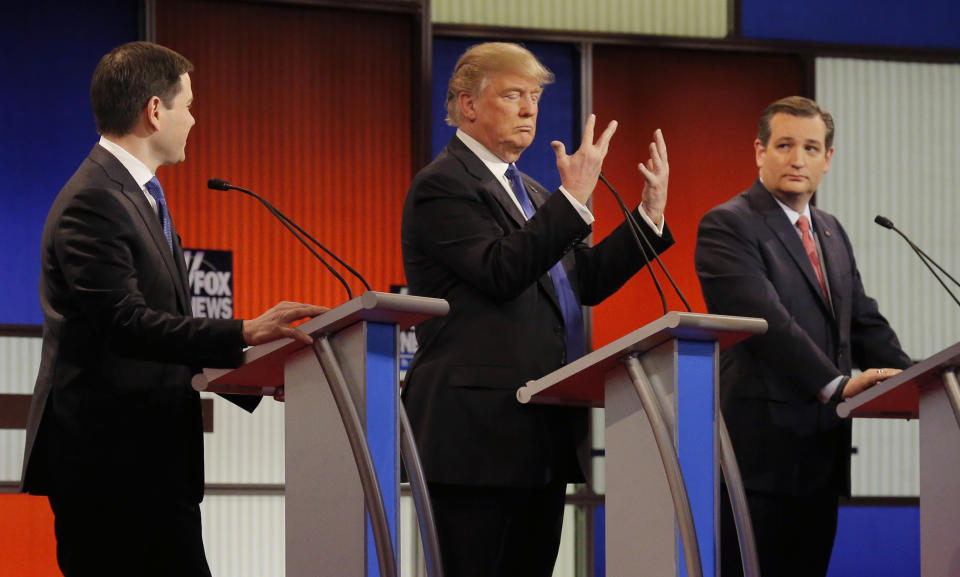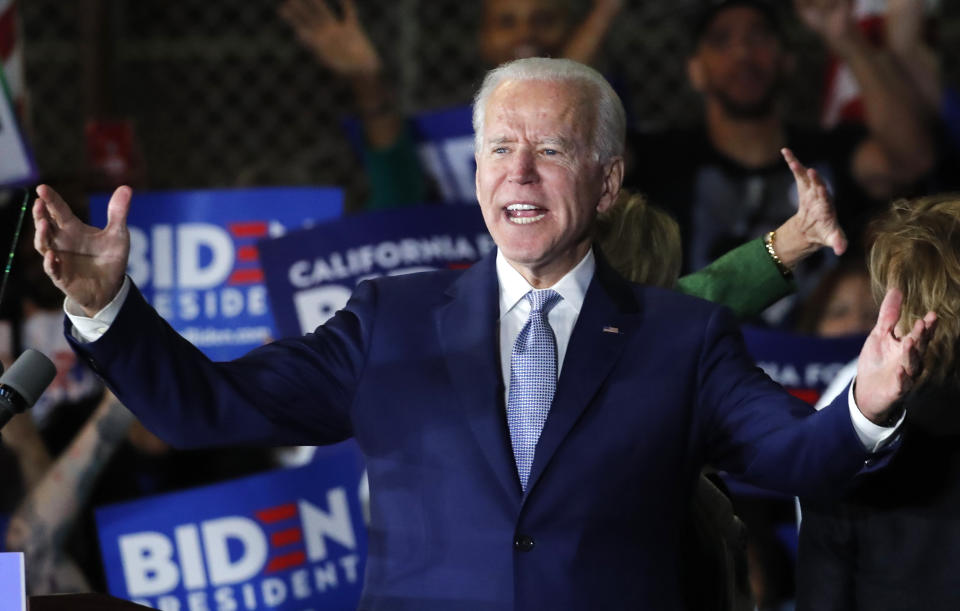2020 Democrats learned the lesson of Trump's GOP takeover: Unite or die
WASHINGTON — If President Trump is defeated in the fall election this year, history books will most likely pinpoint Leap Day weekend as a decisive moment, when Democrats did what Republicans could not do four years earlier.
Until this past weekend, Democrats were headed for a hostile takeover by a candidate with only about 30 percent support in the party, Bernie Sanders. It was eerily similar to Trump’s path to the Republican nomination in 2016.
The Republican Party did not want Trump in 2016: not the majority of voters, or party leaders, or even delegates to the convention. Even Trump’s vice president, Mike Pence, described him as “unacceptable” early in the process, according to an associate of his.
But Jeb Bush and Marco Rubio and John Kasich and Ted Cruz split the majority vote among themselves and let Trump in the door and on his way to the White House. When it was all over, Trump won the nomination after winning about 45 percent of the primary vote. On the Democratic side in 2016, meanwhile, Sanders won 43 percent of the vote but still lost to Hillary Clinton, the only other major candidate in the race.
Sanders watched what happened when Trump took on a crowded field and saw a path to the nomination for himself in 2020. This might help explain why the democratic socialist from Vermont did not make more of an effort to reach out to supporters of other candidates after strong showings in Iowa, New Hampshire and Nevada.
Sanders’s qualified defense of Fidel Castro on a recent episode of “60 Minutes” reflected his trademark refusal to change his tune for moderate voters. The Vermont senator’s fans appreciate what they see as his bluntness and authenticity, but for those more skeptical of Sanders, his refusal to ever tack to the center looks like a worrying ideological rigidity.
Sanders did not anticipate that Pete Buttigieg, Amy Klobuchar, Michael Bloomberg and Tom Steyer might learn from 2016 and adapt.
Buttigieg dropped out the day after the South Carolina primary and endorsed Joe Biden the day before Super Tuesday, the same day that Klobuchar dropped out and endorsed Biden. It was exactly the kind of fall-on-your-sword self-sacrifice that would have saved the GOP from Trump in 2016.

Now Biden is the delegate leader, the popular vote leader, and the frontrunner with a clear path to the nomination, though Sanders will likely fight to the convention in July.
“What we have that the people in 2016 didn’t have is 2016,” a senior adviser to one of the departed candidates, who didn’t want to identify their specific campaign, told Yahoo News.
“The Cruzes of the world, they did not think Donald Trump was going to win. We know, because we have the benefit of history and hindsight, when you get into a dynamic like that, that person with 30 percent of the vote — who does not represent a majority of your party, let alone the country — can still win,” the Democratic campaign adviser said.
But if experience was a teacher pushing Buttigieg and Klobuchar away from the example of 2016, the incentive pulling them toward their concession speeches was more likely fear of another four years of Trump as much as anything else.
“The animating question has been who can beat Donald Trump,” the senior adviser said.
Tim Miller, who was a spokesman for Jeb Bush’s 2016 campaign, told Yahoo News that Democrats had followed the path he wrote about in late February, before it was clear that Biden even had a shot at a resurgence.
“If Sanders is going to be stopped ... Recognize how substantial his advantage is. Use the maximum possible leverage to reverse it. And take it to him,” Miller advised the Democrats.
Half measures, waiting to see how things played out — anything less than an “all in” approach, Miller said — would merely help Sanders.

Miller also told Yahoo News that Democrats have a “different and more pragmatic coalition” than Republicans do. That’s largely a reference to the African-American vote, which is “not purely ideological,” unlike the progressive voters who form the bedrock of Sanders’s support. The black vote, Miller said, combined with an overflow of voters in the more moderate suburbs to boost Biden.
Buttigieg and Klobuchar dropped out in response to an overwhelming vote of support for Biden from South Carolina Democrats, the majority of whom are African-American.
“I don’t think Pete Buttigieg dropped out because someone told him to. He’s a free-thinking human being,” said Lily Adams, who was the communications director for Sen. Kamala Harris’s presidential campaign, which ended in early December.
Sanders complained Wednesday that his campaign “has taken on the entire political establishment, and that is an establishment which is working frantically to defeat us.”
But the truth is that the only organized action taken by establishment figures was to remove themselves from consideration, of their own free will, to narrow the options for voters, who then overwhelmingly went to the polls on Tuesday to support Biden.
The massive turnout numbers — up exponentially from 2016 — are not a sign of a Democratic electorate that is dissatisfied with fewer options, but rather an indication of excitement that the party is uniting around a consensus pick to take on Trump.
_____
Read more from Yahoo News:


